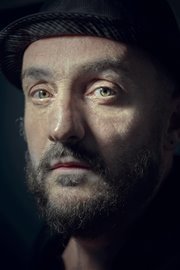Environment - 2nd prize
Hunger Solutions
Luca Locatelli
For National Geographic
For National Geographic
20 February, 2017
Ruud Veloo monitors an experimental photobioreactor, in which light fuels the growth of microalgae, which are used to produce proteins and lipids, the basis of many food chains, at AlgaePARC, Wageningen, the Netherlands.
The planet must produce more food in the next four decades than all farmers in history have harvested over the past 8,000 years. Small and densely populated, the Netherlands lacks conventional sources for large-scale agriculture but, mainly through innovative agricultural practice, has become the globe’s second largest exporter of food as measured by value. It is beaten only by the USA, which has 270 times its landmass.
Since 2000, Dutch farmers have dramatically decreased dependency on water for key crops, as well as substantially cutting the use of chemical pesticides and antibiotics. Much of the research behind this takes place at Wageningen University and Research (WUR), widely regarded as the world’s top agricultural research institution. WUR is the nodal point of ‘Food Valley’, an expansive cluster of agricultural technology start-ups and experimental farms that point to possible solutions to the globe’s hunger crisis.

Luca Locatelli
Luca Locatelli is an environmental photographer and film-maker focused on the relations between people, science-technology and the environment. Locatelli produces his stories ...
Through our education programs, the World Press Photo Foundation encourages diverse accounts of the world that present stories with different perspectives.
Our exhibitions showcase stories that make people stop, feel, think and act to a worldwide audience.
Our annual contest recognizes and rewards the best in photojournalism and documentary photography.
